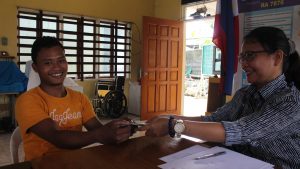
Homecomings are one of those very special moments that could happen to someone’s life. It is when after many years of wanderings, adventures, and of being away, you finally return to where you began. Many have experienced this joyous occasion, others haven’t, and to some is but bittersweet.
During the height of COVID-19 pandemic in 2020, many have experienced bitter homecomings especially those affected workers in Metro Manila. Many lose their jobs and opted to return to their hometowns rather than starving in the country’s capital.
One of them of is Ricky Boy Azarcon, 23, of Barangay Puyat, Carmen municipality in Surigao del Sur province.
In 2016, when he was just 18 years old, Ricky Boy went to Las Piñas City in Manila in search for a better life. Like many other individuals from the countryside, Ricky Boy was very determined to find greener pasture.
However, living there isn’t a walk in the park. It was his first to the hustle and bustle of the city life. Everywhere he turned, he always have to spend money from his shallow pocket. Rent. Food. Water. Transportation. No such thing as free lunch.
Ricky Boy doesn’t have a choice but to accept an illegal job – producing pirated DVDs. Who can blame him? He has to earn a living so won’t end up on the streets. But after a few years, he quit his job after he had conflict with his boss’s son.
There is no giving up for Ricky Boy, so he worked as a security guard for a meager Php350 a day. It was during this time that he met his partner: Lizel Laurente, who is also from Surigao del Sur province. After many months of dating, both decided to live together. For a couple of years, both tightened their belts just to make ends meet.
Then came the COVID-19 pandemic.
“Grabe gyud among pagka-ipit didto. Nawad-an mi og trabaho tungod sa pandemic ug wala mi halos makaon (Our life there becomes much worse . We barely have food because we lose our jobs because of the pandemic),” Ricky Boy said. “Buntis akong partner pero wala koy ikapalit og prutas ug tarong nga pagkaon (I couldn’t even buy fruits and decent meal for my pregnant partner).”
Luckily, both of them received Php8,000 each from the Department of Social Welfare and Development’s (DSWD) Social Amelioration Program, thus they were able to pay their long-due rent, water and electric bills, and debts. After that, they were again in same dire situation.
Their hardship during the pandemic doesn’t end there. Ricky Boy faced the greatest trial of his life when Lizel was about to give birth to their child.
“When Lizel was in labor, we really have no money that time,” Ricky Boy recounted.
“Tungod kay lockdown, naglisud mi og masakyan. Ako na lang gikugos akong asawa ug nangita og masakyan. Nagpakaluoy ko sa mga tricycle driver kay wala mi kwarta (Since it there was lockdown, transportation is scarce. So I just carried my wife to look for a ride. I beg to tricycle drivers around to give us a lift since we really have no money), Ricky Boy said.
He said they tried around 12 birthing centers and hospitals before his wife was accommodated. Lizel delivered their firstborn through a C-Section procedure.
Three months after that, Ricky Boy finally decided to go home to Surigao with his family. Their parents also raised money that was just enough for their fare.
“Wa gani mi halos makaon sa byahe tungod kay igo lang gyud ang kwarta para pamilete (We even have nothing to eat during the trip since the money was just enough for our fare),” Ricky Boy said.
Ricky Boy felt a sigh of relief when they reached home in Carmen in October 2020. Several months later, he was identifed as one of the beneficiary of the Balik Probinsya, Bagong Pag-asa (BP2) program of DSWD.
Last December 2021, Ricky Boy’s family received Php32,000 transitory family support package and is set to receive Php50,000 Livelihood Settlement Grant from BP2 program, which was implemented by DSWD’s KALAHI-CIDSS.
The BP2 was institutionalized by virtue of Executive Order 114 series of 2020, anchored on a vision of achieving a balanced regional development and equitable distribution of wealth, resources, and opportunities through policies and programs that boost countryside development and inclusive growth, provide adequate social services, and promote full employment, industrialization and an improved quality of life in rural areas.
BP2 is also a strategy of the government that seeks to decongest the National Capital Region (NCR) and highly urbanized areas by allowing residents from these areas to go back to their provincial residence to start a new life.
Ricky Boy said he is very much thankful to DSWD’s BP2 program as it helped them back on their feet. Despite the hardships he experienced in Metro Manila during the height of the pandemic, Ricky Boy is still grateful that he is now home.

